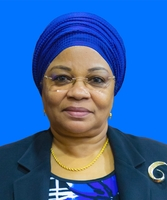Alumni of the Month

Natu E. MWAMBA
YEAR OF MATRICULATION: 1981
EDUCATION:
Previously an academic on the teaching and research staff of the University of Dar es Salaam, and currently a senior executive official within the Tanzanian Government, Dr. Natu Mwamba (neé El-Maamry) is an alumna of the University of Dar es Salaam - of the graduating class of 1984.
Born in October 1961, of a parent who was himself a graduate lawyer and senior official in government and in civic organisations (the late Alhaji Said Hamad El-Maamry), Natu was taken by parents early to school in the mid-1960s (1966/7), managing to attain her primary and secondary school education ahead of many of her contemporaries—especially girls—in the rural countryside, as she benefitted further from a progressively motivating family atmosphere. In 1981, she was admitted to the University of Dar es Salaam, into the Faculty of Arts and Social Sciences¾now College of Social Sciences, where she took a three-year degree programme majoring in economics. She completed the course in 1984, getting a BA honours degree. On account of a record of outstanding academic performance, she was retained by the Department of Economics for a staff-development position of tutorial assistant, pending registering for postgraduate study and rising to permanent higher positions. Thus, in more or less the same year (1984), she embarked on a two-year postgraduate training programme in economics, which involved both coursework and field research. She successfully completed the programme in 1986, earning an MA degree in Economics.
Upon earning her MA in economics, Natu was re-categorised from tutorial assistant to assistant lecturer and, with the existence of a dedicated economic research unit, the Economic Research Bureau (ERB) within the same Faculty, Ms Mwamba had a double advantage of participating fully in the Bureau’s research programmes and thus frequently bearing the more or less equivalent title of assistant research fellow. The close internal relationship and collaboration between the Economics Department and the ERB gave her wider research areas and practical research experiences, such that this further facilitated her mobility towards registration for and pursuit of a PhD programme. This was with the University of Nottingham in UK, beginning in the early 1990s. She specialised more in microeconomics. She obtained her PhD in 1998.
Dr Mwamba rose through the ranks from tutorial assistant, to assistant research fellow, to assistant lecturer, to lecturer and to senior lecturer before she grew up within the University academic ranks from tutorial assistant to assistant lecturer/assistant research fellow to lecturer/research fellow, to senior lecturer before the end of her stint within University employ. Apart from these academic positions, she played a number of administrative roles, including that of a Departmental/Institute research coordinator and that of associate/acting Director within the University’s Directorate of Planning and Development, DPD. Indeed, she was one of the dynamic role-players particularly in the second decade of the University’s Corporate Strategic Plan (2004-2013) bent as it was on the institutional transformation the University of Dar es Salaam as an influential institution of higher learning in the country.
As early as August 2004, Dr. Mwamba had been appointed by the Ministry of Finance and Planning to serve on the Board of Directors of the Bank of Tanzania as a member for six years up to March 2011. On the 13th of June 2011--as she had just completed her term on BoT Board--she received a Presidential appointment from H.E. Dr. Jakaya Kikwete, then President of Tanzania, to take up the position of Deputy Governor of the Bank. She worked as Deputy Governor for a period of six years from 2011 to 2017, when she was appointed to another similarly senior executive position as Permanent Secretary and Paymaster General in the Ministry of Finance and Planning. She has been serving in government in this position for the last six years. Naturally, it is pleasing to note that, for the two positions of Deputy Governor of BoT and that of Permanent Secretary of the Ministry of Finance, Natu Mwamba was a first-ever female to be appointed to such a position. Doesn’t this send a message that at those points in time she had been educated and trained well enough to compete with the males within the traditionally unequal and male-dominated field of education and employment? Isn’t this a clear mark of distinction and achievement within the changing socio-cultural landscape of the Tanzanian society?
As an academic and professional, Dr Mwamba has written widely in her field of economics, particularly on micro-economic issues centring on the informal sector, transport, household budgeting and their implications to development. The University of Dar es Salaam congratulates her sincerely on all her accomplishments and wishes her all the best in the future

